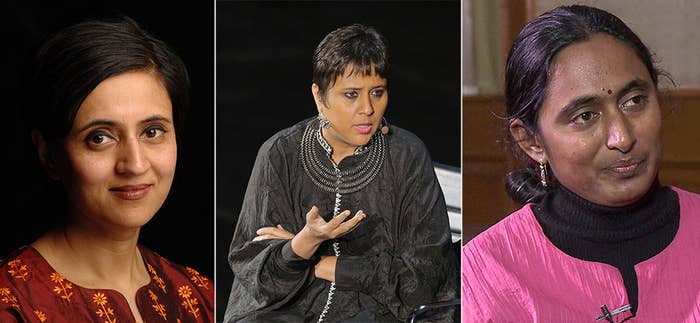
In a country where misogyny runs deep in our psyche, and rape convictions expose a shocking culture of impunity, the persistent abuse hurled at women online by trolls hiding behind the safe smokescreen of the internet should barely hold much shock value.
Women – particularly very successful women who speak their minds and wear their ideologies on their sleeves – have long been targets for online spite.
Women face harassment simply for the audacity of holding a particular stance.
They are casually threatened with gang rape, murder, and violence, have profanities flung at them, and are abused unremittingly. Often, women face sexualised, violent harassment online simply for the audacity to hold a particular political stance, wear certain types of clothes, or speak about notions of sex and liberty in terms that don't sit well with India's self-appointed online conscience-keepers.
Last week the hatred plummeted to dangerous new depths. AICC spokesperson Priyanka Chaturvedi was threatened with "rape and death like Nirbhaya".
Over on Facebook, strait-laced vitriol was spewed at activist Kavita Krishnan after she defended students' rights to have "free sex". When Facebook "Spoilt Modern Woman" shared her comments, trolls asked Krishnan if her mother had had free sex.
And NDTV anchor Barkha Dutt – Twitter's preferred prey – found her phone number being circulated en masse with an appendage that read "Randi TV ki randi anchor ka number".
The same week, women and child development minister Menaka Gandhi announced the impending launch of a portal for women to register complaints of harassment online.
Does India need a new set of laws to protect women from new forms of abuse taking place on new mediums?
Gandhi told Dutt's channel she'd also asked the home ministry to create a separate department to deal with "viciousness against women on the net".
It's unclear what this statement pointed at precisely, in terms of the government's thinking about a new legislative fiat to deal with trolls.
But the Draft National Policy for Women is explicit in its recognition of the fact that the growth of the internet has led to "new and varied forms of sexual abuse such as cyber crimes and harassment of women through mobiles and internet". It goes on to acknowledge that "regulatory frameworks are not in pace with the growth in technology as yet".
So is India badly in need of a new set of laws to protect women on cyber highways to hell?
The question poses a tricky moral dilemma for anybody who recognises the criticality of curbing hate speech and online misogyny, but also considers themself a free-speech absolutist who would stridently oppose all forms of censorship.
While there is an inherent contradiction between the two, there are also legitimate fears on either ends of the argument.
A punitive cyber law regime could be used as a red herring to curb dissent and choke free speech in a country already reeling under a potentially dangerous judgment on criminal defamation – these are not unfounded fears.
"I don't think any new law is necessary," Sagarika Ghose, a high-profile journalist since the '90s who has received gendered Twitter abuse herself for several years, told me. "You can take recourse under the existing IPC provisions."
New laws, Ghose said, "can be used as a political sledgehammer by the government".
A punitive cyber law regime could be used as a red herring to curb dissent and choke free speech.
In fact, using protection of women as a pretext for repression has dangerous past precedents.
When the Indecent Representation of Women (Prohibition) Bill was floated in 1986, Madhu Kishwar, editor of Manushi, a magazine focused on feminism and gender issues, wrote that it lent itself "admirably" to the persecution of the press. She said:
If rigorously applied, [a new law] could conceivably be used to ban almost any communication that refers to women in any way because all that is required to make such a reference indecent is for any one person to allege that he or she has been morally injured by it.
On the flipside, many members of India's legal fraternity believe that existing laws are inadequate to keep Indian women safe and free on social media. The approach toward complainants is hostile, and the agencies needed to tackle such offences are wholly missing.
"The legal framework is calling in distress to be reviewed," Pavan Duggal, a cyber-law expert and advocate, told me. "Empirically, I've noticed a massive spurt in the number of trolling and defamation cases after Section 66A of the IT Act was struck down."
Just as new laws would today, 66A was put in place to protect internet users.
The infamous Section 66A listed subjective crimes – including posting anything that anyone found "grossly offensive" or had been "causing annoyance" – and punished them with a prison term of up to three years.
Just as new laws would today, 66A was put in place to protect internet users. Over time, the section was used to charge cartoonists and teenagers; a 20-year-old was even charged for liking a Facebook status that criticised Bal Thakeray. After widespread protests deeming the law an assault on freedom of speech, 66A was struck down a year ago this month.
Now India finds itself on a moral tightrope – how can we protect women online, while also protecting the Indian internet from arbitrary censorship?
We are, sadly, at the same cusp as other countries on this debate and there are no quick benchmarks or best practices to emulate, said Duggal. "We need to customise our own frameworks, keeping in mind our own context."
It is essential to maintain the internet as a safe space for women to claim, enjoy, and use for dissent.
But we must recognise that online misogyny is a modern, amplified reflection of a longstanding sociocultural battle that India needs to wage offline. A new set of cyber laws can't fix an old set of broken mindsets.
